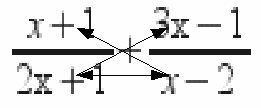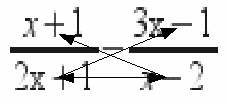Summary
Algebraic fractions involve polynomials, usually expressed in terms of a polynomial![]() divided by other polynomials in
divided by other polynomials in![]() – they may need to be added, subtracted, multiplied or divided. The rules are the same as for ordinary fractions:
– they may need to be added, subtracted, multiplied or divided. The rules are the same as for ordinary fractions:
To add or subtract, we make a common denominator then subtract the numerators.
To multiply, we just “multiply across”, so that the end result is![]()
To divide, turn the dividing, second fraction, upside down, and multiply.
Adding Algebraic Fractions
![]()
The new denominator is![]()

In the diagram above the arrows indicate multiplication
![]()
To illustrate, I will expand the brackets in the numerator and add
![]()
The numerator![]() can be factorised into
can be factorised into![]() There is a common factor
There is a common factor![]() in numerator and denominator which can be cancelled.
in numerator and denominator which can be cancelled.
![]()
Subtracting Algebraic Fractions
![]()
The new denominator is![]()

In the diagram above the arrows indicate multiplication
![]()
To illustrate, I will expand the brackets in the numerator and subtract
![]()
There is no common factor.
Multiplying Algebraic Fractions
Just multiply across
![]()
There are no common factors so we cannot cancel.
![]()
Dividing Algebraic Fractions
Turn the second, dividing fraction upside down and multiply as above:
![]()
